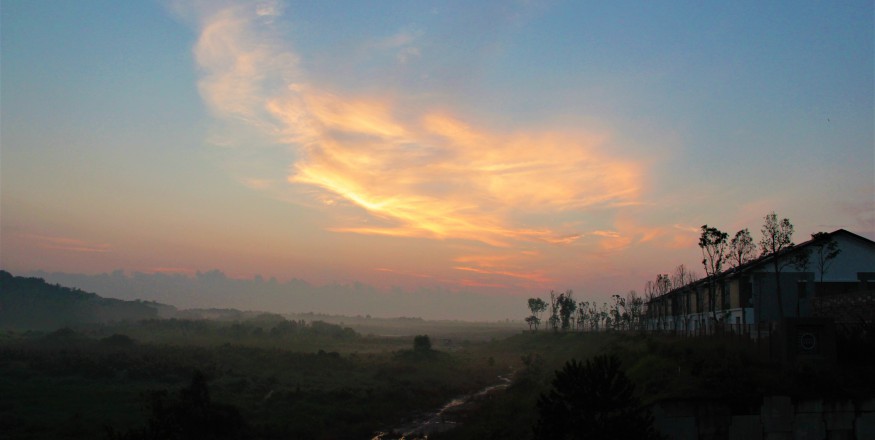They sat at a small table meant for two, just outside a café near the Fontana di Trevi. Each ordered a glass of wine—Cay, a Sauvignon Blanc; Tanya, a Chardonnay. Cay had never liked the dry taste of white wine. He opened a pack of cigarettes, handed one to Tanya, and lit hers before lighting his own. A puff of smoke escaped his lips, carried away quickly by the breeze blowing across from the opposite street.
At first, they said nothing. Instead, they observed their surroundings. Tanya had once told him she disliked crowded places. Although the street they were on wasn’t as packed as the nearby squares, a steady stream of foreign visitors passed by. The only thing grounding them in the moment was the flickering candlelight on their table, softening the irritation brought by the noise and motion.
Their glasses of wine arrived, accompanied by a small bowl of pitted olives and spiraled bite-sized biscuits. They each took a sip at the same time—a quiet harmony neither had planned, yet both felt. Finally, Cay spoke.
“Lovely day it has been, hasn’t it?” he said, still unsure of his ability to keep company.
Tanya turned and gave a nod, smiling as she did. Their eyes locked again—their last meeting gaze had been earlier, beneath the stretched synthetic shade of a different café.
Cay leaned forward and gently moved a lock of her hair behind her ear, revealing a gold earring that shimmered under the candlelight. The lower half of her face glowed warmly, and her eyes sparkled green in the dim. They seemed to brighten even more when she smiled.
He could sense she welcomed his touch. His knuckles, slightly rough, trailed softly down the side of her neck. Her skin leaned into his warmth. They spoke little, but they both knew what lingered between them—an excitement born from quiet understanding. They had grown closer since lunch.
“You’re really beautiful,” Cay said. “Your eyes… they—I can’t stop looking into them.”
He retracted his hand to give her space to compose herself.
“Thank you,” Tanya said. “I’ve really enjoyed your company too.”
Cay imagined the blush rising beneath her dark, glistening skin—subtle, but unmistakable.
He felt a wave of relief. He had doubted whether she felt the same, but now, their feelings had aligned. Even if just for this moment, it was enough. Any intrusion now would have shattered something sacred.
They returned to their relaxed positions—Cay leaning against the wall, facing the street, while Tanya tilted her head toward the candle, resting her chin on one hand. It was a pose Cay interpreted as an invitation to keep the conversation going.
They talked more—about music, books, their favorite authors and bands. All while sipping their glasses slowly, the wine dwindling to droplets. Cay felt the warmth of the Sauvignon in his throat and chest. It made him bolder, as if encouraging him to speak more freely. The timing was perfect—he was, after all, in the presence of beauty.
They eventually left the café and walked back to the hostel side by side. Cay’s hand found her waist—not just to shield her from the cold. Her eyes brightened again at his touch.
Cay’s secondary school years were anything but joyful. He had been a chubby student—same as in primary school. The faces around him changed, but the mockery never did.
He developed a quiet sensitivity toward his own body. He wasn’t slim like the other boys. In Malaysia, adolescent boys often aspired to look frail, so they could squeeze into the tiniest clothes. Muscles and mass were deemed undesirable.
Cultural expectations took their toll. Asian pop idols, with their porcelain skin and razor-thin limbs, shaped the standard. Adolescents struggled to live up to the images—especially when their own faces broke out in acne and their voices cracked at inconvenient times.
Cay carried all the awkwardness on his face: erupting pimples, childish hair, an underdeveloped jawline, and an innocence that made him look naïve. People rarely spoke to him. He seemed too quiet, too inexperienced in the world of high school experimentation—flirting, fake personas, fleeting friendships.
He kept one habit—eating an apple during lunch. But the longer school hours forced him to descend to the cafeteria more often, sometimes accompanied by classmates he barely knew. Their only real commonality was being taught by the same teachers inside the same concrete classroom. Still, it was better than walking alone. The boys acted like fools; the girls, meanwhile, were just beginning to discover the power of makeup and performance.
Lunch was routine—rice, vegetables, and meat. No one liked the noodles. Everyone agreed—teachers included—that they tasted of strong alkaline, and the soup was thin and synthetic. It wasn’t worth the price.
These weren’t his best years. In fact, they were some of the darkest. He often spoke to the mirror in his bedroom, reflecting on how the body he saw was shaped by years of poor eating and low self-esteem.
He resented what he saw without the shield of his school uniform: a soft belly, round face, sagging chest, and that ridiculous double chin. He hated the face most of all. People judged faces first, and his, he believed, told a story no one wanted to read.
The laughter behind his back, the insults from boys—each chipped away at whatever dignity he had left. He felt crushed under their gaze, desperate to belong.
“Don’t you like talking to people, Cay?” a girl once asked after class.
“Because you all laugh at me,” he wanted to say. But instead, he mumbled something about preferring to listen. Always listening. Always shrinking.
He was a passive creature—cornered and worn down by his own kind. Adolescents with their shallow longings, driven by their own insecurities, clashed with Cay’s desire to simply exist.
ns216.73.216.85da2





















